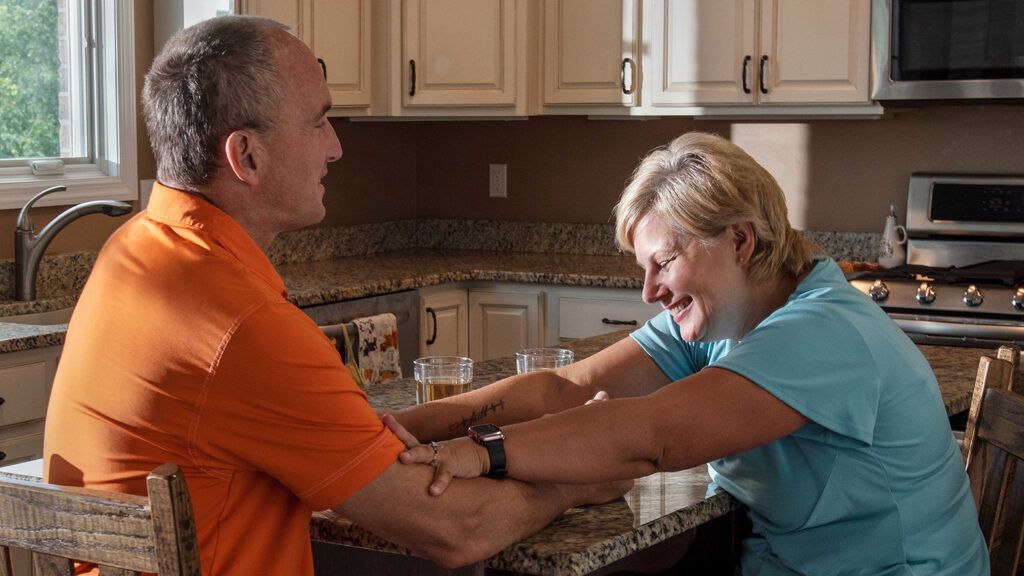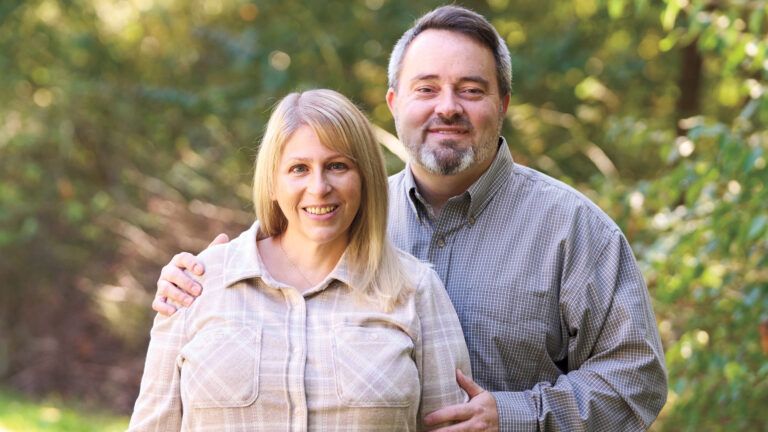Hundreds of swimming caps bobbed in the blue-green waters of Northwest Indiana’s Wolf Lake. I strained to catch a glimpse of my husband, Todd, among the Leon’s Triathlon competitors.
“Do you think he’s okay?” I asked Emily, my teenage daughter. We’d come from our home in Pittsburgh, Pennsylvania. The first racers were already making their way across the beach to their bikes for the second leg. “He’s been out there a long time.”
Emily nodded, her lips pressed tight. This wasn’t easy for either of us.
I’d never worried about Todd the first seven years of our marriage, the second for both of us. He was strong, tall, independent. Retired Navy, though he still worked the same job as a nuclear health physicist. He absolutely lived to compete. He’d done 75 triathlons and 35 marathons, a passion that bordered on obsession. Vacations were spent traveling to competitions. His training regimen—times, distances, splits, routes, heart rate and more, all recorded faithfully on a spreadsheet— took priority over everything. Including me, I sometimes felt.
I resented the time it took away from us, from family, from church. I’d never understood it. Until our world turned upside down in 2015. Nearly two years later, all that mattered to me was helping him reclaim that drive again, to be the old, competitive Todd. The thing that had bugged me most about him. Now I’d give anything to get it back.
June 2015. We’d just come back from dinner, our third night in Aruba, an early anniversary celebration. It was the first time in more than a year we’d gone someplace, just the two of us. I’d planned every part of the trip. I was working for a corporate travel management company at the time, a dream job for someone who thrives on attention to detail and no surprises.
“I think I’m having a heart attack,” Todd said. “My chest is really hurting.”
“It’s probably just something you ate,” I said. My 50-year-old husband was not having a heart attack. I mean, he’d just completed the Boston Marathon that past April and qualified for the following year’s.
“We should go to the hospital,” Todd insisted.
A taxi took us to a small hospital, where an EKG confirmed Todd’s fears. The doctors couldn’t do a heart catheterization, the treatment that would have been done in the U.S. “We’ll give him a mix of blood thinners,” a doctor explained. “That should stabilize him enough to get home.”
I wasn’t allowed to stay overnight in the cramped hospital. I found myself praying Todd would be in good hands. Besides saying grace and attending weekly Mass, I’d never prayed much. In fact, it scared me I was worried enough to pray for my husband. Todd had always seemed invincible.
The next morning, I spoke to the hospital and Todd was doing great. Then, in the time it took for a routine brain scan, everything changed. He was bleeding—a cerebellum hemorrhage, the doctors said. He needed emergency surgery. A priest on call performed last rites. “I don’t know if we can save him,” the doctor said. A shunt was implanted, but Todd’s condition dramatically worsened. He slipped into a coma. I was in shock. If I can just get him back to the U.S. There had to be something doctors with more expertise could do. I arranged an air ambulance to a trauma center in Ft. Lauderdale, Florida, despite the warning that Todd wouldn’t survive the flight. I called my family back home to inform Emily and Todd’s adult sons, Greg and Colby. A friend started a prayer chain. Another friend, from Todd’s work, flew down to be with me.
I was beyond exhausted. Onboard the flight, sitting next to Todd, I couldn’t hold my eyes open. I turned my head. A man sat just feet away, adorned in a radiant white robe. “Todd will recover,” he said, his voice soothing yet powerful, commanding yet comforting. “But the days ahead won’t be easy. Remember I am with you. ” What? Only God himself could give me that kind of assurance. Could this really be him? Was this Jesus? I had so many questions. The vision faded. There was only Todd beside me, the plane quiet except for the sound of the engines and the ventilator keeping my husband alive. I squeezed Todd’s hand.
The plane landed, and an ambulance whisked us to the trauma center. More surgery, this time for a herniated brain stem. But the doctors were no more hopeful. “He’ll likely never regain any significant brain function,” they said.
Medically, I had nothing to cling to. Just that inexplicable vision—or was it a dream?—on the plane. And a thought that wouldn’t leave me: You don’t know Todd. That almost incomprehensible drive. I couldn’t give up on him.
I called 10 neurosurgeons back in Pittsburgh before I found one willing to admit him to an ICU. For 46 days, doctors drained fluid from his brain and administered meds to fight infection. I never left Todd’s side. I massaged his arms and legs. Played soothing music and DVDs of elite athlete triathlons, the ones he used to watch while riding his stationary bike.
At last he was stable enough to be transferred to an acute long-term care center. His eyes were open, but he remained unresponsive, breathing through a tube in his trachea. It was mostly a kind of holding pattern. Todd would have never wanted to be kept alive like this. I was sleeping at home now. How long could I hold out? I didn’t have Todd’s strength.
On August 4, I woke up angry. It was our eighth anniversary, nearly two months since Aruba. I was done. Lord, if Todd is still in there, he needs to show me something!
An idea came to me on the way to the care center. “I want you to plug his trach,” I told the speech therapist. “If he can talk, that means there’s brain activity. If he can’t…” I couldn’t bear to say the words.
Reluctantly, she blocked the hole in Todd’s throat, then stood back. Todd lay in his bed, motionless. I pressed my lips against his ear. “You need to step up. Say something. No one believes in you but me. Help me prove them wrong.”
No response. Not even an eye blink. I turned away.
“I love you. Oppy versary.”
The words garbled. Barely above a whisper. But there was no mistaking that voice. Todd. Still fighting. “Oh, honey,” I said. I turned, but his face showed no hint of what we’d just witnessed.
The speech therapist and I exchanged glances. “We need to reassess,” she said.
The new diagnosis was nearly as grim. “It’s called locked-in syndrome,” the doctor explained. “It’s a neurological condition in which the patient is aware but cannot move and in most cases can’t communicate verbally due to a paralysis of nearly all voluntary muscles. There’s rarely improvement. I’m sorry.”
Still, I insisted Todd be transferred to a rehab hospital. He was weaned off his trachea tube and received daily therapies. He grew more aware, making sounds. The doctors warned me not to expect much. But I clung to that vision on the plane.
The last day of September, Todd’s Reiki therapist was working on his scalp. “The energy I’m feeling, it’s burning hot,” she said.
The doctors agreed to an MRI. It showed a brain infection near the shunt. A surgeon removed the shunt. Something happened during that operation, as if a key were turned that unlocked him.
Almost overnight, Todd became alert. His speech more clear. Able to move his fingers. Turn his head. “I can’t explain it,” his doctor said. “This just doesn’t happen.”
“You remembered to register me for Boston, right? The deadline was in September,” Todd said one day. His words were garbled but understandable.
How was I supposed to tell him there was no way he was running a marathon? He couldn’t even stand on his own. Of course, I hadn’t sent in the registration. That was the last thing on my mind. “Yes, I did,” I said. I felt awful about lying, but there was no way I was going to crush his spirit.
October 22 was Emily’s birthday. On his own, Todd called her and very shakily sang “Happy Birthday.” Nearly every day Todd was making advances. Everyone marveled at his drive, his intensity. That all-too-familiar obsession with reaching the next level, one I had always struggled to understand.
Just before Christmas, Todd came home, getting around in a wheelchair. By the following April, he went back to work part-time. Labor Day weekend, we had a huge party. There wasn’t a dry eye in the house when Todd thanked everyone for their support and their prayers. “I especially want to thank my wife,” he said, his words coming out slowly, deliberately. “Without her, I literally wouldn’t be here.”
Our relationship had changed forever. For the first time in our marriage, it felt as if we were truly connected. We prayed together, feeling God’s presence in our lives in a way we never had before, in a way that started on the plane. Jesus had been with us on this whole journey.
By the spring of 2017, Todd had achieved the impossible, but I could tell he was struggling, unhappy with the challenge of walking more confidently with a cane.
He needed a bigger test. I looked for races for people with disabilities. I found Leon’s Triathlon, a sprint triathlon with a primary focus on disabled veterans. When I called, I learned that Todd, a 27-year Navy veteran, could definitely have a slot.
“I want to do it,” Todd said. That familiar gleam in his eye. He made a harness so he could walk on the treadmill. Used a hand-cycle to train for the bike leg. Started swimming. Recording his times every day in his resurrected spreadsheet.
Now, standing on the shore of Wolf Lake with Emily, I couldn’t help but second-guess myself. Racer after racer, a lot of them amputees, streamed past. There was no sign of Todd. Like many of the racers, he was swimming with an aide. Finally he emerged from the lake and, with the help of the aide, made his way to the hand-cycle. Minutes later, he was out of sight, chasing the pack.
That competitive obsession was no longer a mystery to me or a bane to our marriage. God had blessed Todd with it, knowing fully the challenges that lay ahead of him. And it was a gift to me too, as much as that moment on the plane, when I was given hope for the impossible.
For more inspiring stories, subscribe to Guideposts magazine.






